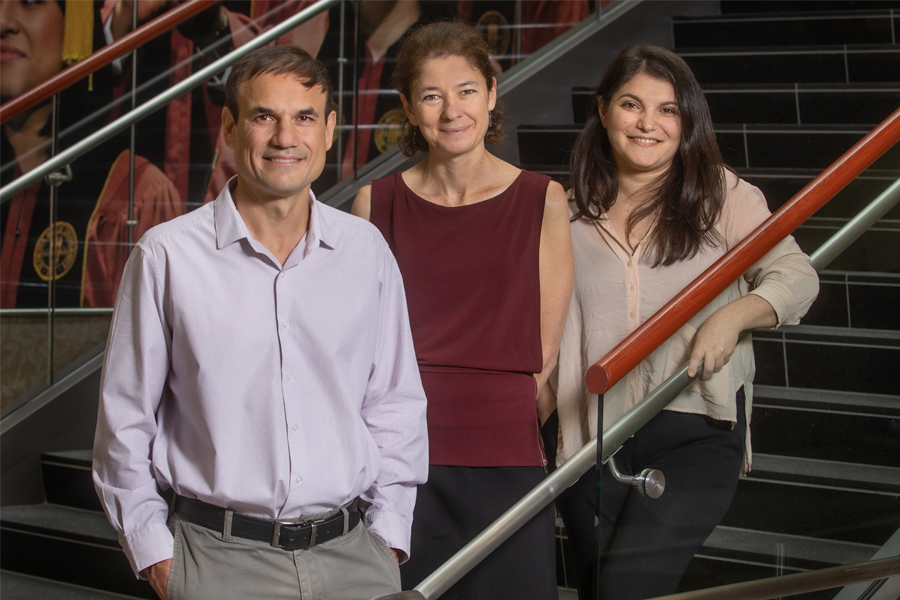Research by ISL Faculty Affiliates finds sense of purpose associated with better memory

From left, Professor Antonio Terracciano, Professor Angelina Sutin and Assistant Professor Martina Luchetti from the Florida State University College of Medicine. Their research showed an association between a sense of purpose in life and more vivid, coherent and accessible memories, qualities that are part of what's known as phenomenology. Their work was published in the journal Memory. (Bruce Palmer/FSU Photography Services)
A new study led by Faculty Affiliates of the Institute for Successful Longevity showed a link between an individual’s sense of purpose and their ability to recall vivid details. The researchers found that while both a sense of purpose and cognitive function made memories easier to recall, only a sense of purpose bestowed the benefits of vividness and coherence.
The study, which focused on memories related to the COVID-19 pandemic, was published in the journal Memory.
“Personal memories serve really important functions in everyday life,” said Angelina Sutin, a professor in the College of Medicine and the paper’s lead author. “They help us to set goals, control emotions and build intimacy with others. We also know people with a greater sense of purpose perform better on objective memory tests, like remembering a list of words. We were interested in whether purpose was also associated with the quality of memories of important personal experiences because such qualities may be one reason why purpose is associated with better mental and physical health.”
Nearly 800 study participants reported on their sense of purpose and completed tasks that measured their cognitive processing speed in January and February 2020, before the ongoing coronavirus pandemic took hold in the U.S. Researchers then measured participants’ ability to retrieve and describe personal memories about the pandemic in July 2020, several months into the public health crisis.
Participants with a stronger sense of purpose in life reported that their memories were more accessible, coherent and vivid than participants with less purpose. Those with a higher sense of purpose also reported many sensory details, spoke about their memories more from a first-person perspective and reported more positive feeling and less negative feeling when asked to retrieve a memory.
The researchers also found that depressive symptoms had little effect on the ability to recall vivid details in memories, suggesting that the connection between life purpose and memory recall is not due to the fewer depressive symptoms among individuals higher in purpose.
Purpose in life has been consistently associated with better episodic memory, such as the number of words retrieved correctly on a memory task. This latest research expands on those connections to memory by showing a correlation between purpose and the richness of personal memory.
“We chose to measure the ability to recall memories associated with the COVID-19 pandemic because the pandemic is an event that touched everyone, but there has been a wide range of experiences and reactions to it that should be apparent in memories,” said co-author Martina Luchetti, an assistant professor in the College of Medicine.
Along with the association with better memory, previous research has found other numerous benefits connected with having a sense of purpose, from a lower risk of death to better physical and mental health.
“Memories help people to sustain their well-being, social connections and cognitive health,” said co-author Antonio Terracciano, a professor in the College of Medicine. “This research gives us more insight into the connections between a sense of purpose and the richness of personal memories. The vividness of those memories and how they fit into a coherent narrative may be one pathway through which purpose leads to these better outcomes.”
Damaris Aschwanden, a postdoctoral researcher at the FSU College of Medicine and also an ISL Faculty Affiliate, and Yannick Stephan, a researcher at the University of Montpellier in Montpellier, France, contributed to this study.
This research was supported by the National Institute on Aging, a division of the National Institutes of Health, under award number R01AG074573.












